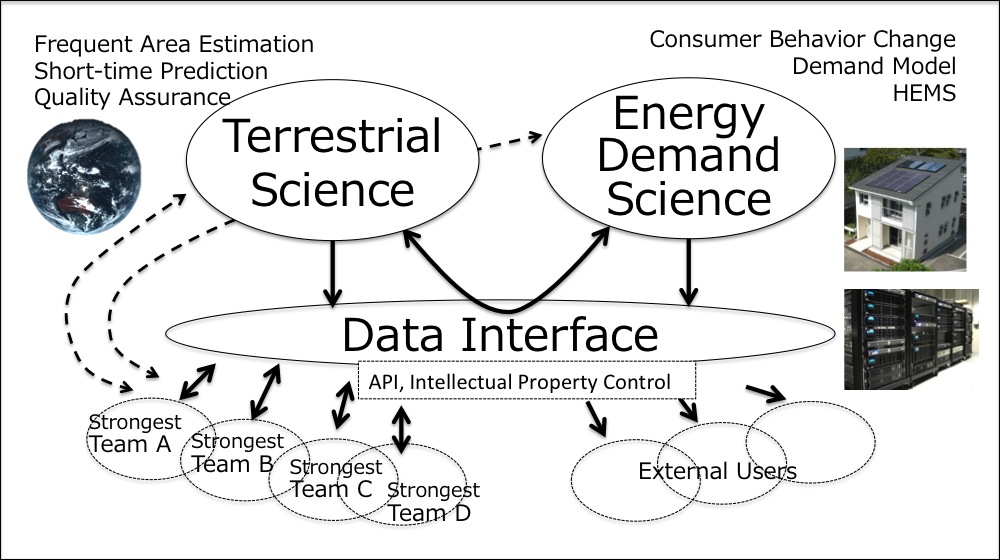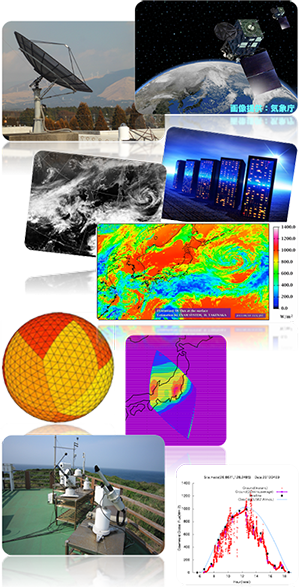Rresearch Summary

Our research purpose is to contribute to Energy Management System (EMS) by establishing theory foundation of the states and the variations of terrestrial information related to energy estimation and of energy demand, both as scientific elements. The team will cooperatively advance the essential research in EMS on geoscience and on energy demand, and we particularly aim to answer the following questions;
- How precise the estimated geo-scientific data in the current state, of short-term forecast and in the future will be
- What factors determine energy demand; What can control consumer demand in a cooperative distributed EMS and how each means works
- How the geo-scientific information will influence energy demand, and consequently, what effect is brought on EMS
This collaborative study in terrestrial information and energy demand is a unique and brand-new research framework.
Research Subjects
The feature of this EMS research area is to integrate technologies across broad dicipline toward social application. The team produced results during the first research period of 2.5 years, which was to gain mutual understanding in diverse fields, such as system science, control, communication, energy, social science and terrestrial science.
In the second research period of 5 years starting from FY 2015, we are going to conduct the research with the following points: to consider our roll in the portfolio of the whole EMS research area, to make the best use of our specialties in the terrestrial and energy demand science, and to cooperate with other fields.
Followings are the detailed research subjects and methods.
1. Analysis System of Satellite Data (Tokai Univ., JAXA-UTokyo, Chiba Univ.)
- Enhance the solar radiation estimation system of quasi-real time analysis with the meteorological data and so on. Specifically, upgrade the system for the new Himawari 8th and calculate surface solar radiation worldwide.
- Improve the usability of the satellite data, and plan to put the system into site operation.
2. Estimation System of Geophysical Quantity using Models (JAXA-UTokyo)
- Apply MIROC the general circulation model and NICAM the non-hydrostatic atmospheric model to the project.
- Develop a system to estimate solar radiation, wind vector and surface temperature of the present globe, or of arbitrary time and point in the 21st century.
3. Quality Assurance and Abnormal Data Detection (Chiba Univ.)
- Evaluate the accuracy of the geophysical quantities gained from the satellite observation and the model calculation, by utilizing SKYNET the ground observation system and JMA’s meteorological observatory data.
- Construct a system to detect abnormal data of satellite-based solar radiation.
4. Variation Analysis in Meteorological Data (Tokai Univ.)
- Research indexes to quantify variations in solar radiation and others.
5. Creation of Scenario Data (JAXA-UTokyo Group is in charge)
- Prepare basic data, based on the situation scenario, that evaluates the theories and technologies about control and prediction of the energy supply and demand, bearing in mind the application of simulated future climate.
6. Development of Energy Demand Model (Osaka Univ.)
- Develop an energy demand model that estimates chronological energy demand and also minutely estimates the size of controllable power consumption adjusted by the cooperative distributed EMS and its response speed.
- Evaluate the accuracy of the model for improvement.
7. Analysis to Construct Demand Data Platform (IIS)
- Collect and examine demand data that is usable to evaluate the cooperative distributed EMS, and investigate demand controllability whilst physical characteristics of the data and consumer adaptability are taken into account
- Try implementing the established HEMS model into the real sites and discover the route to logic simplification and practical use.
8. Development of Consumer Behavior Model (Tokyo Tech)
- Perceive consumers to be important active resources of the cooperative distributed EMS, examine the effect of the consumer behavior on the system, and develop a consumer behavior model.
9. Organization of Energy Consumer Information (Osaka Univ., IIS, Tokyo Tech)
- Organize consumer data that have been or are going to be obtained.
10. Data Interface (all groups)
- Cooperate in providing data and drafting data sharing policy within the research area. Following the policy, standardize the data that is estimated or developed by the team. Moreover, develop data interface to utilize the data.
11. Interaction across Fields (all groups)
- Follow the basic policy to mutually understand different fields such as measurement control, electric power and terrestrial science, make use of our strengths, cooperate with other teams in the EMS research area, and conduct the research.
12. Summarization of the Outcome (all groups)
- Exchange information within and outside the team, cooperate each other, and manage and conduct the research.
- Summarize the research at the end of each fiscal year and the final year.



We have our facebook page written in Japanese.


